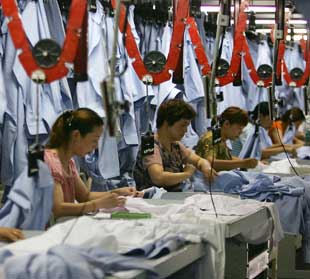There are many big name brands out there in the fashion world that sadly use sweatshops to produce garments and products very quickly and very, very cheaply to keep up with their consumers demands. The main sweatshop countries are China, India and South America.
 Unfortunately we are living in a country where the majority of people are obsessed with “fast fashion”. This means that the garments you see in shops are made within six weeks of being seen on the catwalk. By the turn out being so quick this means that people, who are either fed up with their fairly new garments or who want to “keep in trend” and want the new seasons outfits, can just pop back in to the shops and grab the next up and coming season for a small bargain.
Unfortunately we are living in a country where the majority of people are obsessed with “fast fashion”. This means that the garments you see in shops are made within six weeks of being seen on the catwalk. By the turn out being so quick this means that people, who are either fed up with their fairly new garments or who want to “keep in trend” and want the new seasons outfits, can just pop back in to the shops and grab the next up and coming season for a small bargain.
Big supermarkets chains are notorious for using sweatshops, such as Tesco and Asda to obtain their fashion garments and toys. Their workers are severely underpaid ,incredibly under nourished and to top it all off, living in very bad living conditions.
Shops like Primark and most supermarkets are well known for copying catwalk designs, and at very low prices they offer the products at, it is very understandable why the UK loves “Fast Fashion” and the leading retailers choose to ignore ethical trading and human rights.
(John Hilary 2009)
Instead this means that retailers can keep their consumers consuming and very fast rates, in which they continue to buy their inexpensive clothing lines from the big, underpaid factories, which in turn means they can retail at very low prices continually.
Unfortunately the factories which produce our fast fashion steal their workers of their most basic human rights including refusing workers toilet breaks, making workers (mostly woman and often children) work long hours and even locking fire doors and guarding exits to keep them working through the night.
(Calvin Klein, 2000)
There are continual reports of abuse from working over time and with no pay. The over time can be as long as over 80 hours a week.Bangladeshi workers were interviewed by War on Want, mentioned in their report Fashion Victims 2 (How UK Retailers Are Keeping Workers In Poverty) stated that the hours they work barely cover their everyday needs.
“Runa, a young woman worker in her early twenties in a factory producing for both Asda and Tesco, explained: “I work for Tk 2900 (about £24.73) per month. My pay is so meager that I cannot afford to keep my child with me. I have sent my five-month old baby to the village to be cared for by my mother.”
(John Hilary 2009)
Sadly these UK retailers are very reluctant to give up their constant profit for the rights of their overseas workers, who which they probably never have to meet.With not only sweatshops being unethical they are also bad for the environment, with little recycling to none and the carbon footprint is huge. They are having to transport the garments from China, South America and India to the UK. They are transporting these garments all over the world, and you haven’t even had the garment on!
If we were to produce and source our in demand products right here in the UK we could vastly decrease the country’s carbon footprint that is caused by the thousands of miles travelled for a £10 dress.
There will always be a connection between the designer and the consumer but the connection that is lost is between the customer and the maker. The fact that sweatshops are used is sometimes a forgotten thought and you never know who, never mind where, the garment you are about to wear out is made by. It’s not like the label on the dress is going to say “Made in a Sweatshop by a 5 year old Indian girl”.We know where the original idea came from, but not who put the time and effort in to making millions of copies of it.
With new designers coming out, there are more and more of them becoming aware of the problems of a sweatshop and they are making it known to the world what is happening in these unseen sweatshops.They are thinking ethically and also environmentally.
However, what some designers pass off as fairtrade and ethically made may not be true. As seen with the “I am not a Plastic Bag” bag. It was discovered that the £5 bag was actually made in China, then shipped over to Britain causing great carbon emissions. Oh and it’s not organic either!
 Chic and cheap: Keira Knightley with one of the Anya Hindmarch bags, which is neither organic nor fair trade.(Sean Poulter)
Chic and cheap: Keira Knightley with one of the Anya Hindmarch bags, which is neither organic nor fair trade.(Sean Poulter)
Martin Hearson, of pressure group Let's Clean Up Fashion, added: "This is bordering on the hypocritical.
"There is an incompatibility in claiming that a product is ethical and then manufacturing it in China."
(Sean Poulter)
However, this all may be all and good, but unfortunately it would create a massive backlash.It would mean that the prices of the garments and products that are selling on the shop floor would have to rise greatly. But there would be the satisfaction of knowing that your garment was “ethically and environmentally friendly produced”.
But, we also have to think about the workers, as there would be a huge amount of fashion houses and textile companies that would stop using the sweatshops if this went through. Therefore the workers would be left without work and then they would not be able to afford basic needs for their families.
It’s a lose, lose situation sadly, that has and should be made in to a win, win situation, by everyone.
Next time, think about how much that £5 t-shirt actually costs.
Hillary, http://www.waronwant.org/attachments/Fashion%20Victims%20II.pdf,
Klein, 2000, No logo: no space, no choice, no jobs, London, Flamingo
Rosen,E,2002,The Globalization of the U.S Apparel Industry ,California; University of California Press
http://www.veganpeace.com/

Big supermarkets chains are notorious for using sweatshops, such as Tesco and Asda to obtain their fashion garments and toys. Their workers are severely underpaid ,incredibly under nourished and to top it all off, living in very bad living conditions.
Shops like Primark and most supermarkets are well known for copying catwalk designs, and at very low prices they offer the products at, it is very understandable why the UK loves “Fast Fashion” and the leading retailers choose to ignore ethical trading and human rights.
(John Hilary 2009)
Instead this means that retailers can keep their consumers consuming and very fast rates, in which they continue to buy their inexpensive clothing lines from the big, underpaid factories, which in turn means they can retail at very low prices continually.
Unfortunately the factories which produce our fast fashion steal their workers of their most basic human rights including refusing workers toilet breaks, making workers (mostly woman and often children) work long hours and even locking fire doors and guarding exits to keep them working through the night.
(Calvin Klein, 2000)
There are continual reports of abuse from working over time and with no pay. The over time can be as long as over 80 hours a week.Bangladeshi workers were interviewed by War on Want, mentioned in their report Fashion Victims 2 (How UK Retailers Are Keeping Workers In Poverty) stated that the hours they work barely cover their everyday needs.
“Runa, a young woman worker in her early twenties in a factory producing for both Asda and Tesco, explained: “I work for Tk 2900 (about £24.73) per month. My pay is so meager that I cannot afford to keep my child with me. I have sent my five-month old baby to the village to be cared for by my mother.”
(John Hilary 2009)
Sadly these UK retailers are very reluctant to give up their constant profit for the rights of their overseas workers, who which they probably never have to meet.With not only sweatshops being unethical they are also bad for the environment, with little recycling to none and the carbon footprint is huge. They are having to transport the garments from China, South America and India to the UK. They are transporting these garments all over the world, and you haven’t even had the garment on!
If we were to produce and source our in demand products right here in the UK we could vastly decrease the country’s carbon footprint that is caused by the thousands of miles travelled for a £10 dress.
There will always be a connection between the designer and the consumer but the connection that is lost is between the customer and the maker. The fact that sweatshops are used is sometimes a forgotten thought and you never know who, never mind where, the garment you are about to wear out is made by. It’s not like the label on the dress is going to say “Made in a Sweatshop by a 5 year old Indian girl”.We know where the original idea came from, but not who put the time and effort in to making millions of copies of it.
With new designers coming out, there are more and more of them becoming aware of the problems of a sweatshop and they are making it known to the world what is happening in these unseen sweatshops.They are thinking ethically and also environmentally.
However, what some designers pass off as fairtrade and ethically made may not be true. As seen with the “I am not a Plastic Bag” bag. It was discovered that the £5 bag was actually made in China, then shipped over to Britain causing great carbon emissions. Oh and it’s not organic either!

Martin Hearson, of pressure group Let's Clean Up Fashion, added: "This is bordering on the hypocritical.
"There is an incompatibility in claiming that a product is ethical and then manufacturing it in China."
(Sean Poulter)
However, this all may be all and good, but unfortunately it would create a massive backlash.It would mean that the prices of the garments and products that are selling on the shop floor would have to rise greatly. But there would be the satisfaction of knowing that your garment was “ethically and environmentally friendly produced”.
But, we also have to think about the workers, as there would be a huge amount of fashion houses and textile companies that would stop using the sweatshops if this went through. Therefore the workers would be left without work and then they would not be able to afford basic needs for their families.
It’s a lose, lose situation sadly, that has and should be made in to a win, win situation, by everyone.
Next time, think about how much that £5 t-shirt actually costs.
Hillary, http://www.waronwant.org/attachments/Fashion%20Victims%20II.pdf,
Klein, 2000, No logo: no space, no choice, no jobs, London, Flamingo
McDougall,2007, Child sweatshop shame threatens Gap's ethical image.
http://www.guardian.co.uk/business/2007/oct/28/ethicalbusiness.india
Poulter, That ‘ethical’ bag is made by Chinese cheap labour (…and it’s not organic either) http://www.dailymail.co.uk/news/article-451004/That-ethical-bag-Chinese-cheap-labour---organic-either.htmlRosen,E,2002,The Globalization of the U.S Apparel Industry ,California; University of California Press
http://www.veganpeace.com/



No comments:
Post a Comment